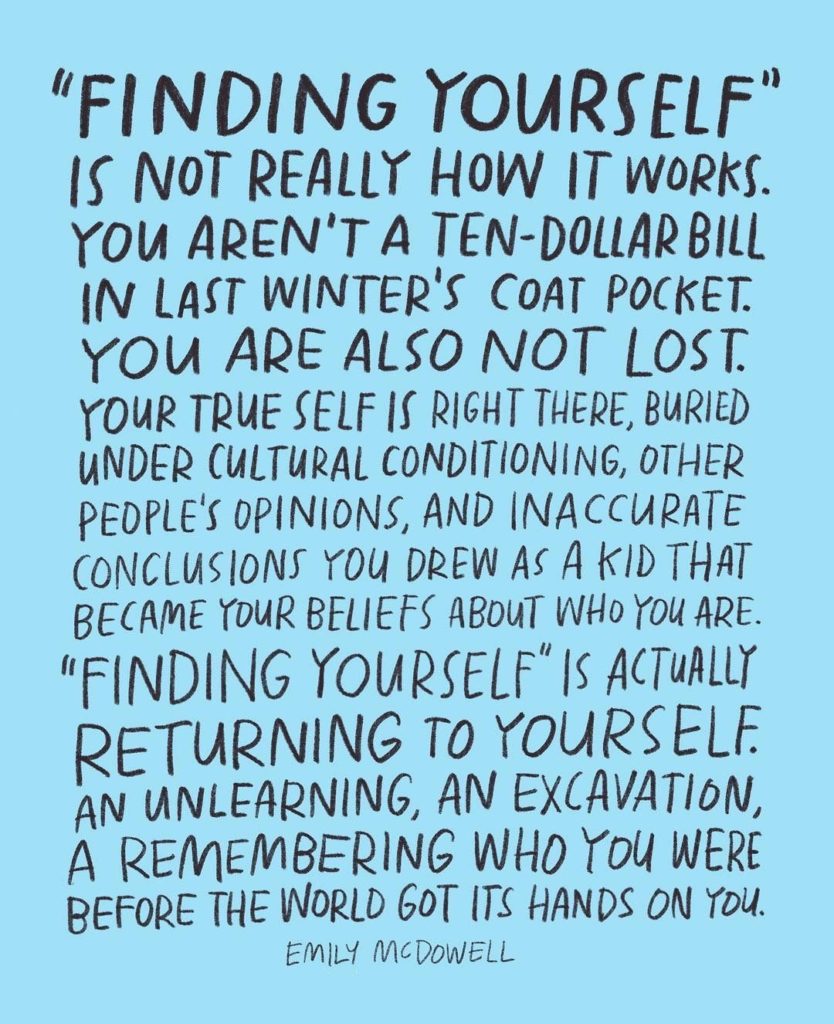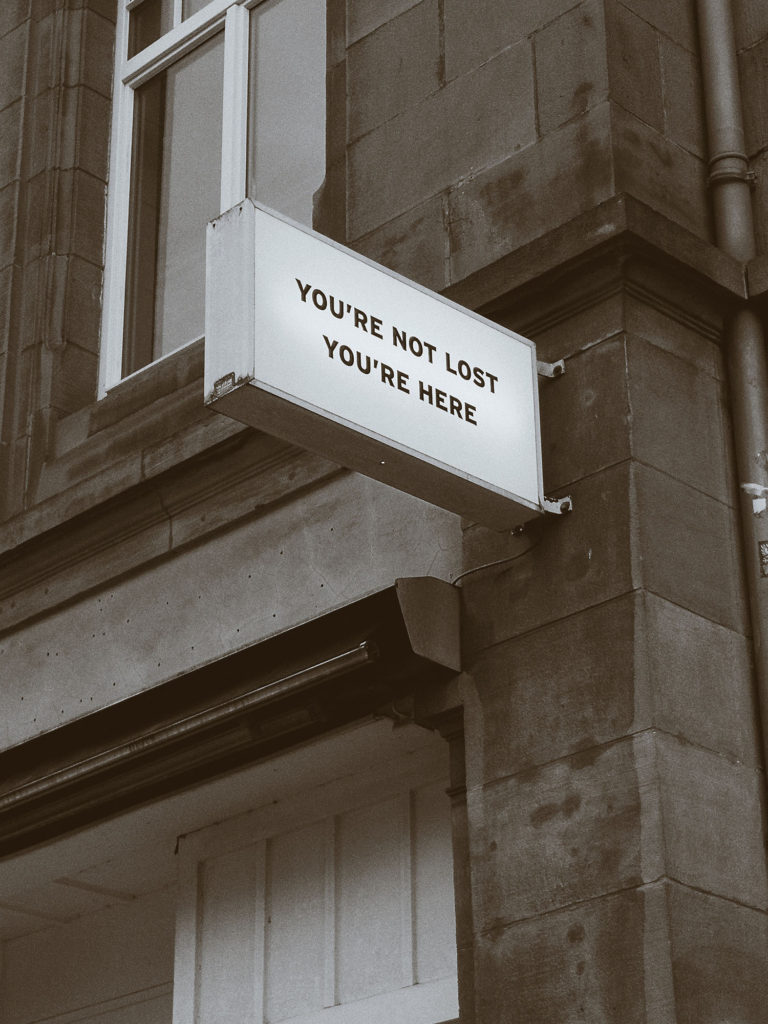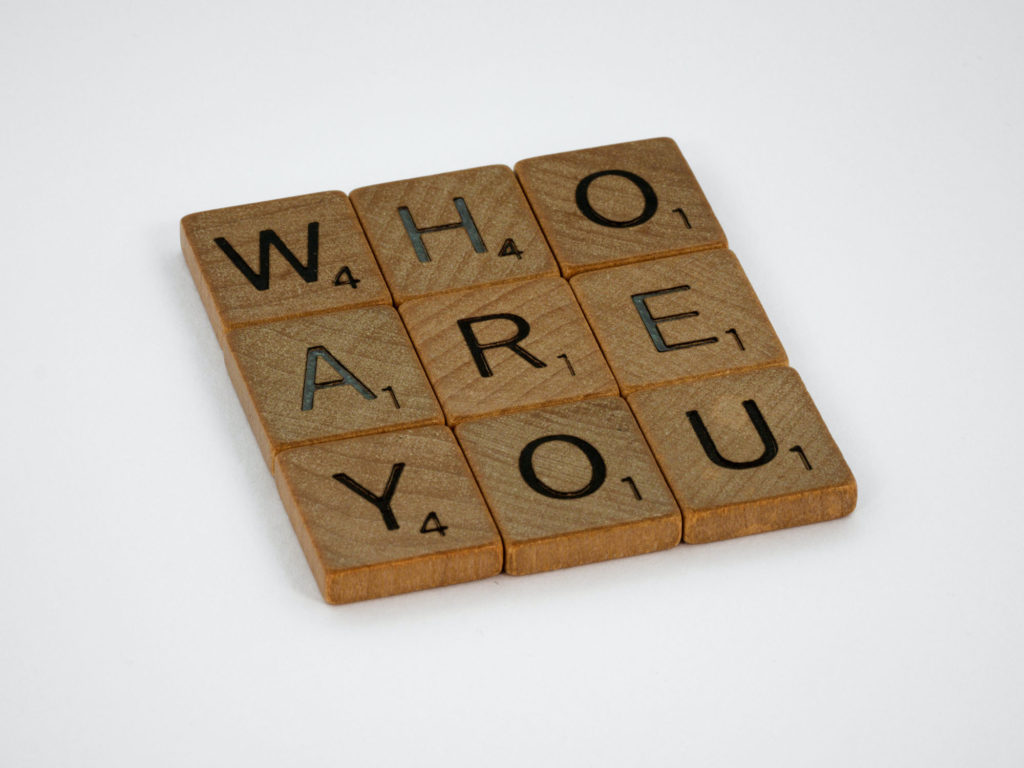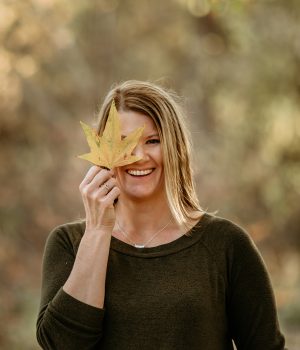Setbacks in life happen to the best of us. When you find yourself knocked down, you might feel lost. In this article, I share three foundational things you need for how to find yourself when you are lost. I have a slightly different take on it than most articles you’ll find out there!

What do you do when you are lost after life knocks you down? How do you find yourself when you are lost?
As I was looking at other articles about how to find yourself when you are lost, most people approach it with quick tips like journaling, meditation, getting out of your comfort zone and trying new things, and meeting new people. Those are all awesome ideas, but what people forget is that you’ve never really lost yourself. Your true self is in you and she always has been.
One of my favorite quotes is this one by Emily McDowell:
Finding yourself is not really how it works. You aren’t a 10 dollar bill in last year’s winter coat pocket. You are also not lost. Your true self is right there, buried under cultural conditioning, other people’s opinions, and inaccurate conclusions you drew as a kid that became your beliefs about who you are. “Finding yourself” is actually returning to yourself. AN unlearning, an excavation, a remembering who you were before the world got its hands on you.
Emily McDowell
I want to impress upon you today that it’s not really so much about trying new things to see what you like, journaling, meditating, practicing mindfulness, trying new things, and all of that stuff. Those are great tools, but you really need to look at what is under the hood too. Who is it that’s buried underneath all of the conditioning, limiting beliefs, and Stories you’ve taken on as you’ve grown throughout your life?
I love the analogy my colleague Ann Becks shared in last week’s episode of Real, Brave, & Unstoppable, likening this to having dirty glasses.
When your glasses are clean, you can see perfectly what’s in front of you. This is your truth. It’s what’s true for you, or what’s authentic for you. But over time, your glasses get dirty. You take on things other people tell you (conditioning), and you believe things that aren’t true. You tell yourself you need to be different, and the glasses get REALLY dirty. And you can’t really see what’s in front of you very well anymore.
You can’t really see what’s true for you, or who you are, anymore.
This work of “finding yourself” isn’t really finding anything. This work is about cleaning off the glasses and uncovering something.
If you only take one thing away from this article today, I want it to be that. That you are still inside of you and always have been. If you feel you are lost, you just need to clear off your glasses.

I’m going to tell you a story.
I grew up in a small town in Minnesota. I have one sister and one brother, and we also had a dog named Rosie. Both sides of my extended family would get together often, so as kids, we had tons of fun. We were creative, imaginative, and played tons of make-believe. They were good times.
Many of us can relate to that, and if you can’t, that’s ok. The point is, there was a time in all of our lives when we were happy with who we are because it didn’t occur to us to be unhappy with ourselves. We were perfect and didn’t know any different.
Of course you were perfect. And you still are perfect. But you started to think that you weren’t perfect based on the opinions of the people around you. The people in your life said something or did something (whether they knew it or not) to make you feel like you needed to be different.
Picture yourself having a beautiful, perfect castle. The castle has hundreds of rooms and all of them are different but they are equally perfect to you. You love them all whether the room is a grand ballroom, a dark closet, or a dusty garage. It would never cross your mind that one was better than another.
But one day, someone came to visit your castle and thought one of your rooms was ugly. They told you that if you wanted a perfect castle, you should lock the door to that room and never let anyone else see it.
Since you are human, and you crave love and belonging, you oblige. You lock the door and don’t let anyone else see that room.
Over time, more and more people come to your castle and give their opinions on your rooms. You want to make sure everyone loves your castle just as much as you do, so you keep locking rooms to make everyone happy. And then, you’re told that you really need to remove those rooms from your castle, but it’s part of the structure of the castle, so you can’t just take them out. You do your very best not to think about those rooms until one day, you completely forget they are there.
This is how we come to feel like we’re lost. We lock away different parts of us that we’ve been told are unacceptable. The problem is, we forget about those parts of us that contribute to the perfect whole, and we forget what the castle looked like with all of the perfect rooms.
You’re asking how to find yourself when you are lost, but you didn’t lose yourself. You just forgot about all of those perfect rooms in your castle.
Just like the rest of us, as I grew up, I closed off many rooms of my castle. I learned:
It’s not ok to be a know-it-all.
You have to do things exactly the right way for them to count.
The way to get positive attention is to do things extra well – do ALL the things well. That offsets any mistakes.
As long as you’re getting praise from others, you’re good enough.
Those are some examples. So, I took on the identity of the perfect good girl who excelled at everything she tried, didn’t screw up, and impressed the hell out of everyone. And if I wasn’t doing that, I felt an incredible amount of shame.
I became that person.
But that’s not who I really am.
In college, I hated myself. I had an eating disorder. Even though I was an aerospace engineering major, I felt like a failure because I wasn’t the smartest one in my classes (even though I was in the top portion of my class!). During this time of my life, I took on the identity of someone who was a mess. Someone who was fat, not pretty, failing, and sucking at everything.
But that’s not who I really am.
I got a coveted internship with The Boeing Company in Seattle one summer. There were only two students from the University of Minnesota engineering programs that were awarded these internships, along with a scholarship. Of course, that felt good. Yet I still was the person who didn’t think she was really smart enough. I was also still the person who wasn’t pretty enough or thin enough. It was during this time that I met my ex-husband.
But none of that is who I really am.
I graduated with a degree in aerospace engineering and was offered three well-paying jobs – every job I applied for. On one hand, I was proud, on the other, there was always a disclaimer. I would think things like, I only got that offer because I’m a woman. Or, I’m not really smart enough … what if they find out I’m not?
Good old imposter syndrome.
I moved to Seattle to work for Boeing and got engaged. Now, I was a woman who was wanted. I was wanted by a man, I was wanted by companies.
But that’s not who I really am.
Next up was marriage, kids, dogs, a house, the “American dream”. I became a wife, a mom, a homeowner. I even bought a horse, so I was a horse owner and a person who spent a lot of money on her hobbies. I became a person who appreciated things – the finer things in life.
I owned a beautiful home, had a beautiful family, all the things that I thought would make me a complete person.
And none of those things are who I really am.
I lost my marriage. I lost my “traditional” family. Iost the beautiful home, horse, friends, and all the things.
Yet that’s not who I am either.
At each of these stages of my life, I identified with my situation. I identified with what I had and what was happening. My life situation became my identity.
But NONE of that is who I am. It never was.

When I got divorced, I went through a really big identity crisis. I had no idea who I was without this life I tangibly held, but had also constructed in my mind. I had a construct of the way things “should” be in my mind so when my life imploded, I struggled because I had made myself into all of these things that were now gone. And with their disappearance, I thought I disappeared too.
But I hadn’t really disappeared. I was never really lost after my divorce. My glasses were just REALLY dirty. And I didn’t realize that I needed to clean them.
There were so many rooms in my beautiful castle that I had locked away. I had completely forgotten about many of them.
I had to unlearn all of the things that I thought were true about me Also, I had to get curious about the locked rooms and examine them to remember that they are not bad. They are part of me, and they are perfect just as they are.
Another one of my favorite quotes is from the alchemist by Paulo Coelho.
Maybe the journey isn’t so much about becoming anything. Maybe it’s about un-becoming everything that isn’t really you so you can be who you were meant to be in the first place.
Paolo Coelho, The Alchemist
We’re taught from a young age that we’re supposed to become something. And you get to a point in your life where you realize that’s not really working because most of us become something that isn’t really who we are. Then you do some work on yourself and you realize this, and you come to find that the real you is buried under layers and layers of “dirt on your glasses”.
So what do you do?
When you catch yourself asking how to find yourself when you feel lost, there are three things that are the foundation of making this amazing journey home to yourself.
Love the Heck Out of Yourself
Highly, highly important! You have to LOVE the hell out of yourself. You have to work on loving ALL the parts of you, even the ones that are hard to love. Even the ones that you’ve deemed unacceptable or that others have told you are unacceptable.
Remember the castle. You have to open up all of the rooms, whether they’re shiny or not. No apologizing for the dirty cellar. No apologizing for the clutter, the dust, or the windows that have fingerprints and streaks on them.
Self-love can feel hard. But only because we’ve been trained that we shouldn’t love all the parts of ourselves. We’ve been trained that there are parts that we should lock away.
To get started, I recommend a journal to record thoughts. I like to do a “brain dump” into my journal. What are all the thoughts I’m having? Write them all down. The good ones, bad ones, negative ones, critical ones, and all of the thoughts. For now, just notice what’s there and show yourself a little love for the part of you that has those thoughts.
Just a little compassion for now. It’s a practice, Your love and compassion for those parts of you will grow.
Stay Present and Notice What’s Going on in Your Brain
Staying present, or mindful, is really important when you feel you need to know how to find yourself when you are lost.
Your brain has all sorts of thoughts running around up there and left unchecked, they can create a lot of chaos. You just want to pay attention to your thoughts and feelings and just notice what’s coming up. What triggered your thought? How does that thought feel in your body? Just get super curious about this! It can be fascinating if you allow it to be fascinating.
Back to journaling, it’s really important to write down the things you find as you notice them come up. A lot of people resist journaling, but it doesn’t have to be a lot of time, and you don’t have to write a lot. There are so many different ways of journaling, and it’s just a really good way to help you get into the habit of practicing presence.
As you get familiar with the narrative, or thoughts, running around in your head, you’re going to start to notice some patterns. You’re going to notice the ones that come up a lot and journaling is going to help you recognize them and kind of make sense of them,
Question Your Thought Patterns
Just because you think it, doesn’t mean it’s true! If you don’t interrupt your brain’s loop of unhelpful thoughts, you’ll just keep believing them, so you need to take the time to get curious and question whether they’re correct or if they’re just thought errors.
Let’s say you gave a talk at work and you stumbled on a question that someone asked. Immediately, you have the shame wave pull you under, you go into black-or-white thinking and tell yourself that because it wasn’t perfect, it sucked.
The underlying thought or belief here is that in order to be good enough or worth anything, you need to do everything perfectly. And if you don’t do that, you’re a complete failure. Or something along those lines.
So when you see that pattern, you want to look at that and challenge it. I have tons of tools to help people do this in a coaching session. It’s really difficult to do this particular work on your own because your blind spots are just not going to let you see them quite as easily.
I’m a coach, and I need a coach to help me see my blind spots. It’s because your brain wants to keep you safe and is going to fight to the death to keep those Stories. So if you try to do that on your own, there are a lot of things you’re going to let your brain talk you into that I, for example, would help you challenge.
So this is really the work. This is the unbecoming. Unbecoming your limiting Stories and writing better, more true stories that represent who you really are. Stories that paint a picture of the entire castle. Not just the pretty rooms.
The three things I just described will help you rewrite your stories.
To rewrite your Stories, you will need to unlock all of the rooms. You’ll need to clean off your glasses. And sometimes this is hard.
If you’ve been in one way of being for a really long time, living with really dirty glasses, seeing the world through squeaky-clean glasses might be kind of a shock. It may take you some time to get used to seeing things truthfully and to really own it.
You’ve been pushing away the person you really are for a long time. It’s going to feel uncomfortable, and your brain isn’t going to want you to go there. So you really have to own who you are. That’s part of the work, and owning it isn’t always easy. It’s a practice and you won’t get it overnight, but that’s your goal – to clean off your glasses, unlock all of the rooms and OWN IT.
Own who you are. Fiercely. And be proud of who you are.
When you finally return to yourself, even if you’re not perfect all the time, there’s nothing in your life that isn’t possible.
You’ll have more confidence and self-esteem. You’ll have the courage to do the hard things. You won’t feel stuck all the time. You’ll feel grounded and peaceful.
It’s a beautiful place to be.


